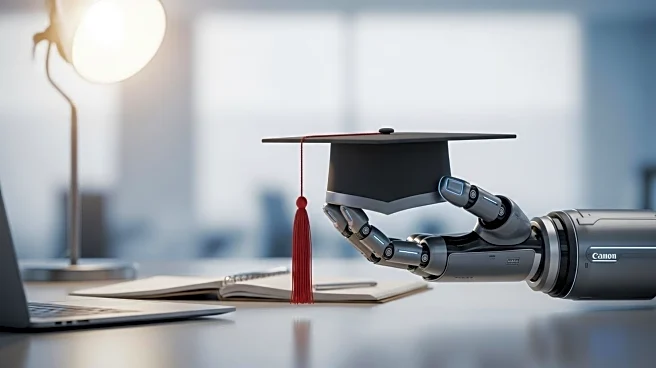What is the story about?
What's Happening?
Entry-level jobs for graduates are disappearing at an unprecedented rate, creating significant challenges for new entrants into the workforce. The convergence of artificial intelligence, political instability, and economic uncertainty is contributing to what some experts are calling a 'jobpocalypse.' According to data from Indeed, job vacancies for new graduates have dropped by approximately 33% over the past year. This decline is occurring as more individuals pursue higher education, resulting in increased competition for fewer available positions. Industry leaders, such as Chris Eldridge from recruitment firm Robert Walters, highlight the difficulty companies face in forecasting economic conditions, leading to a pause in graduate hiring that has persisted for over two years. The impact of AI is particularly pronounced in sectors like law and accounting, where automation threatens to replace tasks traditionally performed by junior employees.
Why It's Important?
The reduction in entry-level job opportunities has significant implications for workforce development and economic stability. As companies reduce hiring, they risk creating a void in talent that could affect their long-term viability. The lack of new hires may lead to overpromotion of existing staff, potentially impacting organizational effectiveness. Furthermore, the shift towards AI-driven processes raises questions about the future of work and the skills required for emerging roles. The legal profession, for example, is experiencing a transformation as AI tools like Simmons & Simmons' Percy automate routine tasks, potentially altering career paths for junior lawyers. This trend underscores the need for educational institutions to adapt curricula to equip graduates with skills relevant to the evolving job market.
What's Next?
The ongoing pause in graduate hiring is likely to result in a talent gap in the coming years, prompting companies to reconsider their recruitment strategies. Organizations may need to balance the integration of AI with the development of human capital to ensure a sustainable workforce pipeline. As AI continues to reshape industries, companies must evaluate the long-term implications of reduced entry-level positions and explore alternative models, such as apprenticeships, to cultivate future talent. Additionally, educational institutions may need to revise their programs to align with the changing demands of the job market, emphasizing critical thinking and adaptability.
Beyond the Headlines
The decline in entry-level jobs raises ethical considerations regarding corporate responsibility and the social duty to train new employees. Companies face the challenge of balancing financial priorities with the need to develop a skilled workforce. The potential shift towards apprenticeship models or indentured labor highlights the historical parallels in workforce development, suggesting that modern solutions may require revisiting traditional practices. As AI continues to influence job structures, the importance of maintaining a robust talent pipeline becomes increasingly evident, necessitating strategic planning and investment in human capital.
















